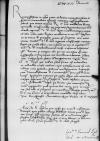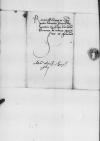List #2364
Samuel MACIEJOWSKI do Ioannes DANTISCUSVilnius, 1540-12-13
| odebrano Heilsberg (Lidzbark Warmiński), 154[0]-12-31 Rękopiśmienne podstawy źródłowe:
| ||||
Tekst + aparat krytyczny + komentarz Zwykły tekst Tekst + komentarz Tekst + aparat krytyczny
Reverendissimo in Christo Patri, domino
Reverendissime in Christo Pater et Domine, amice carissime et honoran(de) or honoran(dissime)⌈honoran(de)honoran(de) or honoran(dissime)⌉.
Commendata officiosa voluntate.
Quid impedimento fuerit, quominus miserim Reverendissimae Dominationi Vestrae mandatum de arca aperienda et inspicienda, ex proximis superioribus meis litteris abunde cognovit Reverendissima Dominatio Vestra. Nunc cum id tantopere expeti ab illa video, mitto duplex mandatum: in uno domini
Reverendissimae Dominationis Vestrae me favori et benevolentiae commendo.
Dat(ae) or Dat(um)⌈Dat(ae)Dat(ae) or Dat(um)⌉
Vestrae Reverendissimae Paternitatis servitor
Postscript:
Mitto Reverendissimae Dominationi Vestrae ea, quae misit huc nova dominus


 BCz, 1597, p. 1156
BCz, 1597, p. 1156